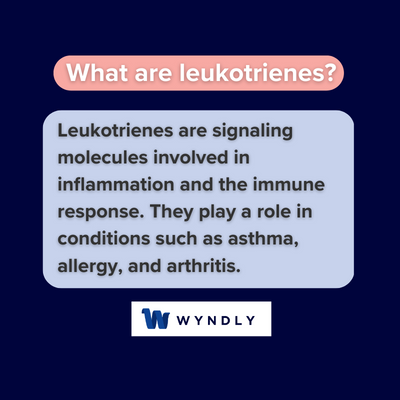What Are Leukotrienes? Defining Leukotrienes

What are leukotrienes and what do they do in the body?
Leukotrienes are a type of chemical messenger in the body that play a role in inflammation and the immune response. They are produced by cells in response to certain triggers, such as allergens or injury.
How are leukotrienes involved in allergic reactions?
Leukotrienes are involved in the immune response to allergens, by causing inflammation and increased mucus production in the airways. They are also involved in the symptoms of asthma, such as wheezing and shortness of breath.
Can leukotriene inhibitors be used to treat allergies?
Yes, leukotriene inhibitors are a type of medication that can be used to treat allergic conditions such as asthma and hay fever. They work by blocking the action of leukotrienes and reducing inflammation in the airways.
What are the side effects of leukotriene inhibitors?
The most common side effects of leukotriene inhibitors are headache, stomach pain, and diarrhea. Less common side effects include allergic reactions, such as rash or hives, and changes in liver function test results.
Are there any foods that can increase leukotriene production in the body?
Some foods, such as fatty fish and certain types of nuts, are rich in omega-3 fatty acids which may reduce the production of leukotrienes in the body. Conversely, foods high in saturated fats such as red meat may increase the production of leukotrienes.
What causes the release of leukotrienes during an allergic reaction?
Leukotrienes are released during an allergic reaction when allergens such as pollen or dust trigger the immune system, causing cells in the body to release these chemical messengers that cause inflammation and other allergic symptoms.
How do leukotrienes contribute to the symptoms of allergic rhinitis?
Leukotrienes contribute to the symptoms of allergic rhinitis, also known as hay fever, by causing inflammation and increased mucus production in the nasal passages. This can lead to symptoms such as nasal congestion, runny nose, and sneezing.
Can leukotriene modifiers be used to treat food allergies?
Leukotriene modifiers are primarily used to treat respiratory allergies such as asthma and allergic rhinitis, but they have not been proven to be effective in treating food allergies.




